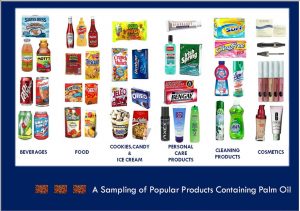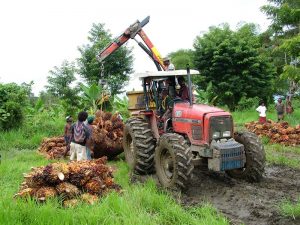Palm oil is used in an incredible array of consumer products. From breakfast cereal to skin moisturizer, everyone is bound to have some palm oil product in their home. Since the objective of the Merida Home is to educate consumers about sustainability in the home (with products such as our all natural fiber area rugs), we feel it is important that people know the issues surrounding palm oil since it is so ubiquitous.

Palm oil is controversial because it contributes to deforestation in some of the world’s most fragile ecosystems. Most palm oil comes from the rain forests of Malaysia and Indonesia, while much of the rest is grown in West Africa. Since it is a renewable resource, palm oil has been used as an “environmentally preferable” replacement for petroleum products, but the phrase “environmentally preferable” is not synonymous with “environmentally sustainable.” The increasing demand for palm oil has caused strain on rain forests and threatens habitats of orangutans, elephants, and critically endangered Sumatran tigers. The orangutan population has been particularly affected by palm deforestation, and zoologists are trying to increase awareness of palm oil before orangutan populations are irreversibly damaged.
There are also human concerns with the harvestation of palm oil. Labor violations are a main argument against palm oil. Since palm oil is produced in economically developing areas of the globe, underpaying workers is not uncommon. However, since light was shed on this issue around 2008, many companies now strive to use only fairly traded palm oil. Other companies are drastically reducing their use of palm oil. General Mills is one American company that has been leading the way in finding ways to reduce the amount of palm oil in its products. Cadbury has stopped using palm oil as an ingredient all together.
It is very difficult to completely stop purchasing palm oil products since it is used in so many different applications, but consumers can become more aware of their palm oil intake by looking for these terms on product labels/ingredient lists: sodium dodecyl, palmate, palmitate, steareth-2, steareth-20, sodium lauryl sulphate, and hydrated palm glyceride. Consumers can also look for labeling that indicates that the palm oil was fairly traded and sustainably harvested. Buy purchasing responsibly produced goods, consumers can send a message to the industry that standard practices need to be improved. This will help save the rainforest, encourage fair labor, and help slow climate change.

Merida Meridian stands for “sustainability with style,” and as a natural fiber rugs manufacturer in the United States for over 30 years, we live this motto every day. Merida is the premier source for distinctively designed woven natural rugs, specializing in a variety of natural fibers, including sisal rugs, jute rugs, wool, paper and abaca. Merida offers a clean, sophisticated aesthetic that matches any room décor and our natural area rugs are uniquely customized through sizing, colors, patterns and a selection of hundreds of different edge finishes.
 Alternative Energy HQ solar power for homes, wind energy, and bio fuel issues
Alternative Energy HQ solar power for homes, wind energy, and bio fuel issues








